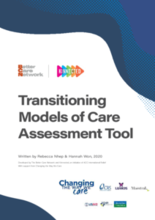Displaying 261 - 270 of 991
This brief from Child Trends explores the transition to adulthood for young people with foster care experience in the U.S., including federal policies impacting the transition.
This study sought to determine number and proportion of children of color with substance removals and whether disparities exist in likelihood of reunification compared to white children.
The purpose of the current study was to better understand the experiences of foster care youth to inform policy and practice recommendations that address the high rate of unintended pregnancies and early parenting among youth transitioning from foster care.
This paper addresses the conceptualization of ‘outcomes’ for care experienced people through an in-depth longitudinal study of 75 young adults in Denmark, England and Norway.
This study investigated Switzerland's first large‐scale care leaver programme and analysed associations between care leavers' needs and contactability in a sample of 459 care leavers.
This tool is designed as an assessment framework that assists practitioners to identify and analyze the key starting point dynamics and determine implications for strategy in their work to transition an organization's model of care of children from institutional to a non-institutional model.
This article explores care leavers’ views and recommendations for practitioners and policymakers on the transition from leaving care to living independently in the community. The article outlines how children and young people affected by child sexual exploitation experience community reintegration, and their views on the key issues reintegration services need to consider.
This report is a short summary of the main findings from 'Building Positive Futures: A Cross-Country Pilot Study on Youth Transitions from Out-of-Home Care in Africa,' written for youth who participated and other interested young people.
This report outlines the peer research approach adopted by the Building Positive Futures project and summarises the findings of the pilot of the peer research methodology on leaving care in Africa.
Given the paucity of research on youth transitioning from alternative care (i.e. care-leaving or leaving care) in Africa, the study sought to develop and test a methodology for a cross-country, comparative study on leaving care in Africa.




